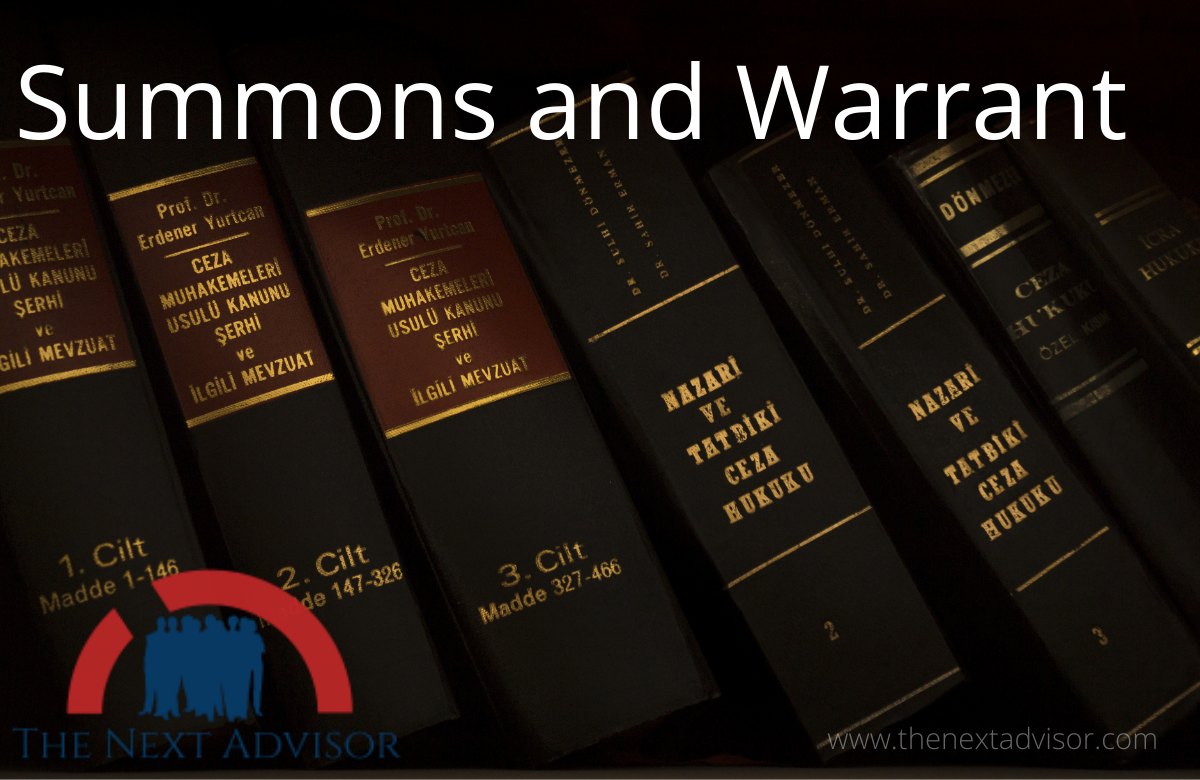Hi, today I would like to put your attention on two terms i.e., SUMMONS and WARRANT. This is the terminology that people want to know about what is warrant and what is Summons. so in English, we have a word, SUMMONS, You get the same written in Hindi S U M M O N. It is a kind of verb in English which means to call someone.
The word SUMMON means to call someone. I would like to explain to you by taking an example, EXAMPLE:- I called you yesterday, why didn’t you come?
Now let’s take this same example by using the SUMMON word. Yesterday I Summon you why didn’t you come?
Summon means to call someone and it is a very simple and short word. But when someone is told that a Summons (call) has come for you from the court. After this, his entire face comes off and his breath comes from the heart to throat. The beating of the heart comes to the neck and the person starts thinking that, I do not know what happened that the Summons came from the court?
Summons means call letters that can be issued by the court and police can also issue Summons.
Sometimes even commissions can issue the summons. Summons means call letter means to call someone to inquire into the matter. It can be issued against an accused and it can be issued against any witness. Summons can also be issued to produce a document.
Provisions for Summons are given in Sections 61 to 69 of CRPC.
There is chapter six of CrPC which is Process to compel appearance,
Provisions have been given for Summons in Part one of CHAPTER SIX of CRPC. This Section ( Section 61-69 ) explains how Summons are sent and how are they issued?
Now here I would like to put your tension on one more thing that why Summons is used in the plural? Because Summons is always issued in two copies. Summons were never issued in one copy. That’s why summon is always used in the plural word (Summons). Understand who cab issue summons? How does summons serve? and When summons should be served? All the information has been given in Chapter Six of CrPC in Part One from Sessions 61 to 69.
when the court issue Summons, it will have a signature will be stamped and it will be mentioned in it that at what time you have to come to which place on which date. Summons are issued to the accused in the name of Accused and to the Witness in the name of Evidence. And if someone has an Important document, then a summons can also be issued to bring it to the court.
Now let us understand What is Warrant. It is also a word of the English language. And that means, “Ahikar Patra”. The Court gives the right to someone to arrest a particular person and present that person in the court. The court can give this right to any police officer or any other person. Through a warrant, that officer to whom the warrant is issued can arrest this person against whom the warrant is issued.
A warrant is in a single copy. If the understanding is enough, then the warrant is in a copy and the understanding is that it is done in the name of sex in the name of some accused, or in the name of any business. But what is warrant is started in the name of that person. Whose rights are given that you can arrest that person and appear in court?
So this warrant can be issued against an accused. Can be issued against any witness. The warrant can be issued to produce documents in court. A warrant can be issued to take a search against any person or to take a search to the house of that person which we call a search warrant!
The provisions for warranty are given in Chapter Six of the CrPC from Section 70 to Section 81.
Section 70 in The Code Of Criminal Procedure, 1973
70. Form of warrant of arrest and duration.
(1) Every warrant of arrest issued by a Court under this Code shall be in writing, signed by the presiding officer of such Court, and shall bear the seal of the Court.
(2) Every such warrant shall remain in force until it is cancelled by the Court which issued it, or until it is executed.
After going through section 70 of the CRPC one thing is understood that there is another difference in the Summons and Warrant. That is Summons is valid only till a specific date and the warrant remains in force till it is executed or canceled by The Honourable Court.
In Summons, it is written that the person for whom Summons is issued has to be present at this place at this time on this date. For example-If in Summons, it is written that you have to be present in the court on the 5th day of January. So on the 5th day of January, Summons will be canceled automatically.
And as it is written in the warrant that you have to bring such person under arrest, then this warrant will remain in force until the court which has issued this warrant cancels the warrant itself or the police produced such person before Court. The person has been given the right to do so if he does not arrest that person and don’t produce that person before the court. Till then this warrant is in force.
A warrant remains in force unless the warrant is canceled or executed. And unless the court which issued the warrant has made it natural or the person to whom this warrant has been issued, he shall not arrest the person and appear before the court.

























